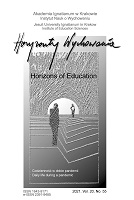Nastrój i emocje Polaków podczas pandemii COVID‑19
Mood and Affect of Adult Poles During the COVID‑19 Pandemic
Author(s): Estera Twardowska‑Staszek, Anna Seredyńska, Irmina Rostek, Krzysztof BielSubject(s): Psychology, Social psychology and group interaction, Behaviorism, Health and medicine and law
Published by: Uniwersytet Ignatianum w Krakowie
Keywords: pandemic; COVID-19; mental health; mood; affect;
Summary/Abstract: RESEARCH OBJECTIVE: The aim of the research was to diagnose the mood and affect of adult Poles during the COVID 19 pandemic and to analyze the connection between the dimensions of mood and affect and sociodemographic variables. THE RESEARCH PROBLEM AND METHODS: In order to answer the question about the mood and affect of Poles during the COVID 19 pandemic two standardized research tools were used: The UMACL Adjective Mood Checklist (Matthews, Chamberlain, Jones; Polish adaptation by Goryńska) and Positive and Negative Affect Schedule (Watson, Clark; Polish adaptation, SUPIN by Brzozo wski). 595 participants took part in the study, 80.50% of whom were women and 19.50% men. The participants were between the age of 18 75 years. THE PROCES OF ARGUMENTATION: A statistical analysis was carried out with the use of the descriptive statistics and nonparametric tests: Mann Whitney and Kruskal Wallis. After detecting statistically significant differences, post hoc analysis with Dunn’s test was performed to identify statistically significant different groups. RESEARCH RESULTS: Chronic pandemic daily life had a significant impact on the mental con dition of Poles, causing lower mood and the domination of negative affect. The current findings suggest that the COVID 19 pandemic has negative consequences for mental health, especially among women (being woman is associated with the severity of tense arousal and negative affect) and people with lower education (including students). CONSULSIONS, INNOVATIONS AND RECOMENDATIONS: The conducted research may help in identifying potential risk groups for mental disorders during the COVID 19 pandemic. These groups may require special attention and support, through the implementation of specific preven tion programs or psychological care, in order to prevent long term negative consequences for their mental health.
Journal: Horyzonty Wychowania
- Issue Year: 20/2021
- Issue No: 55
- Page Range: 11-26
- Page Count: 16
- Language: Polish

